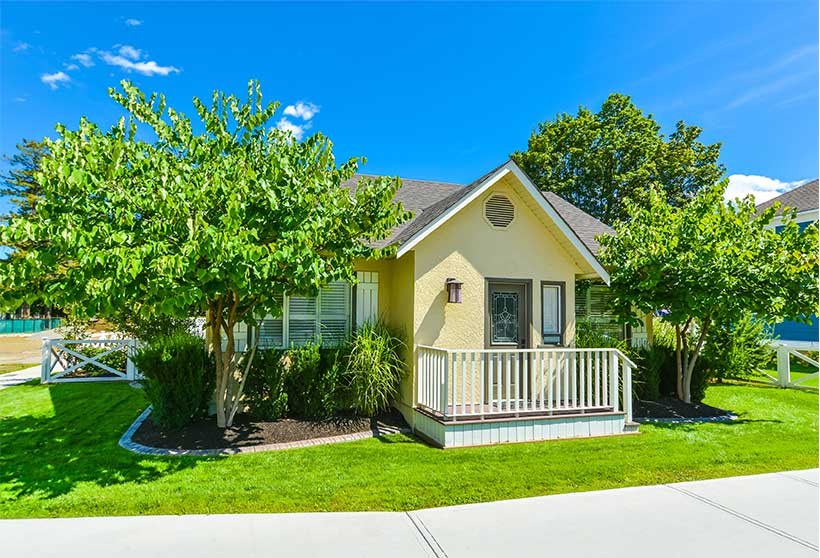Sober Living Homes In Ohio
Sober living homes don’t treat drug or alcohol addiction directly, but they can support a person’s recovery with shelter, security, socialization, and accountability. Learn more about how recovery homes in Ohio work and what they can offer.

Inpatient rehabilitation is the most intensive and effective option for addiction treatment, especially when it comes to severe forms of chronic, compulsive substance abuse.
However, even long-term inpatient addiction recovery programs do come with an end date, after which a person must return to independent living.
Unfortunately, relapse is common during this period, and many people leaving a residential treatment center need additional care and support to maintain their sobriety long-term.
Transitional housing, also known as sober living housing, offers one potential solution for this problem. But what is sober living housing, and how does it work?
The Benefits Of Sober Living Environments
Sober living homes are exactly what they claim to be: homes, or sometimes apartments, that provide a set of residents with a communal, substance-free living environment operating under the oversight of a house manager.
Structure & Support
While sober-living homes do not provide formal addiction treatment, they can meaningfully support those who want to be abstinent by providing a clean and structured environment, social contact, accountability, and peer support.
Encouragement For Continued Treatment
Depending on the specific house rules and requirements, sober homes may also encourage or even require residents to participate in 12-step programs, counseling, therapy, medication-assisted treatment, random drug screenings/breathalyzer tests, outpatient treatment, etc.
Transitional Benefits
Sober homes can also be especially valuable for those who may otherwise not have shelter, who are at a very high risk for relapsing, or those who have recently left incarceration.
And, even if a person does not stay in a home long-term, they can be an important transitional step between residential treatment programs and the full independence of daily life.
Long-Term Benefits
Participating in sober living facilities may help residents remain abstinent more often and for longer periods, improve mental health and self-image, reduce the risk of crime or victimization, and improve employment stability.
Sober Living Housing Vs. Halfway Houses
Sober homes and halfway houses are often used synonymously, though there are differences between the two. Both are transitional living arrangements for those dealing with alcohol or drug addiction, however:
- Halfway houses are compulsory, state-funded residences that help people reenter society after a prison sentence or court-mandated inpatient treatment. They have a lower degree of privacy, curfews, and other strict requirements as well as mandated participation in services like life-skills training, relapse prevention counseling, and mental healthcare.
- Sober living houses are privately-owned, voluntary, and potentially indefinite housing arrangements that give their residents a greater degree of personal flexibility and privacy while they continue to live on-site, though residents are still (usually) required to pay rent, stay alcohol/drug-free, and follow all relevant house rules and requirements
Note that these are generalizations and different recovery residences in various states may work differently or offer other levels of support, privacy, and care depending on the facility and the specific situation.
Paying For Sober Living Housing
The cost of living in a sober living house depends on a wide variety of factors, including the home’s location, amenities, whether rooms are single or shared, the availability of grants and other funding, and more.
Unfortunately, the cost of rent at a sober living home is usually not covered by insurance as it is not considered an essential part of substance use disorder treatment.
Most residents pay for their room and board as they would at any other apartment or residential rental, though certain grants, scholarships, or discounts may be available on an individual basis.
Recovery Housing Options In Ohio
Unregulated and privately operating sober living houses have sometimes been prone to abusive or exploitative behavior. However, the state of Ohio has taken steps to better regulate and control all Ohio recovery housing.
Managed By OhioMHAS
In Ohio, the recovery housing system (including sober living houses and halfway houses) is managed and funded by the Ohio Department of Mental Health & Addiction Services (OhioMHAS) and has been expanded and developed in order to provide as many Ohioans as possible with a safe, healthy, and supportive environment to continue their recovery journey.
Must Be Accredited
As of January 1st, 2025, no entities in Ohio will be able to operate recovery housing residences unless they do so with an accreditation from the state in accordance with the state requirements, and no treatment providers will be able to refer patients to a recovery residence unless it is properly and fully accredited.
OhioMHAS monitors recovery housing in the state, investigates complaints and other potential abuses, and maintains an up-to-date registry and map of recovery housing residences and beds in the state.
Get Help Today
If you or your loved one have been struggling with alcohol abuse, opioid addiction, stimulant addiction, or some other form of chronic substance abuse, we can help.
At Ohio Recovery Center, located in Northwest Ohio, we’re a fully licensed and accredited inpatient treatment facility offering leading, evidence-based drug and alcohol rehab services such as:
- medical detox services
- individual and group psychotherapy
- social support groups
- medication-assisted treatment
- dual diagnosis treatment options
- aftercare planning and support
Contact us today to learn more about your personalized recovery process and how we can support you and your goals for the future.
- Bureau of Community Sanctions https://drc.ohio.gov/static/Forms/SysServ_HWH%20Program%20Directory_1.pdf
- Ohio Department of Mental Health & Addiction Services (OhioMHAS) https://mha.ohio.gov/supporting-providers/housing-providers/recovery-housing/recovery-housing-maps
- Ohio Department of Mental Health & Addiction Services (OhioMHAS) https://mha.ohio.gov/supporting-providers/housing-providers/recovery-housing/recovery-housing-residences
- Substance Abuse and Mental Health Services Administration (SAMHSA) https://store.samhsa.gov/sites/default/files/pep23-10-00-002.pdf

